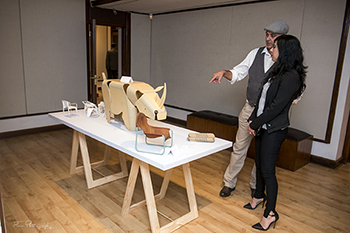
Stratford never lost his passion for designing
furniture. Pictured here is some of his furniture
exhibited at the Oliewenhuis Art Museum.
Photo: Francois van Vuuren: iFlair Photography
Al Stratford, designer, inventor and architect, presented the 28th Sophia Gray Memorial Lecture on 25 August at the Reservoir at the Oliewenhuis Art Museum in Bloemfontein. The event, hosted by the Department of Architecture at the University of the Free State, was also the opening of an exhibition of Stratford’s work.
In his career of 40 years, Stratford has patented many products and won several awards in industrial design and architecture. He is known in South Africa for his development of innovative building technology such as the Winblok Precast Concrete Window System. In 2009 and 2010, he also served as president of the South African Institute of Architects.
The title of his lecture was: Reductive Innovation in Architecture. Throughout his career, Stratford endeavoured – through his designs and inventions – to apply the principle of “reduction” to the building material he used and technology he examined.
Stratford designs and builds smart buildings
Stratford says a home is the paradigm of self-expression. His career as architect started with the building of five houses in Gonubie, near East London. Everything he knew about architecture at that stage, he had taught himself by reading on the subject at the local library. Later on, he achieved great heights in his career by designing and building, among others, the Stratford Guesthouse; the sustainable and resourcefully designed campus buildings for the University of Fort Hare (an institutional building not utilising any electrical air-conditioning); the Edenvale Baptist Church; and a community hall.
His technology is widely used in the building industry
“The arrogance in me gets humiliated when I
see what other people and God has done.”
His technical drawing skills, acquired at an early age during his training as motor mechanic, are still practised years later, particularly in his inventions. Stratford is the inventor of technology commonly used in the building industry today. Of these, the Winblok window system which he patented in 1981, is one of his best known patents. The use of these windows is characteristic of many of the buildings he designed and built. Other technology he invented and patented, includes the Winstep stairs, the Windeck flooring system, and the StratFlex furniture technology.
Furniture designs win him awards
He likes to quote architect Ludwig Mies van der Rohe: “A chair is a very difficult object. A skyscraper is easier.” Stratford started designing and manufacturing his own furniture and never lost this passion. In 2013, he won the Innovation Award at the Design Indaba for his “flat pack” furniture technology.
The humble Stratford – designer, inventor, industrialist, and architect – says he is simply playing around with God’s creation. “The arrogance in me gets humiliated when I see what other people and God has done.”